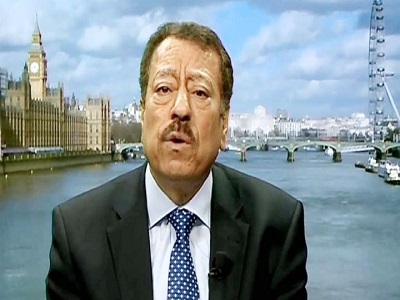The Saudis may yet come to regret assassinating Saleh al-Sammad
The areas of Yemen controlled by the Houthi Ansarallah movement, especially the group’s northern stronghold of Saada and the capital Sanaa, have been in mourning for Saleh al-Sammad — president of the Supreme Political Council (SPC), an eloquent speaker, and close confidant and faithful friend of the movement’s leader, Abelmalek al-Houthi
Sammad was killed on 19 April in a series of intensive bombing raids by warplanes from the Saudi-led coalition on the port city of Hodeida’s Khamseen Street. Details of the incident remain unclear, as the announcement of his death was not made until four days later, and not by the coalition’s spokesman but by Abdelmalek al-Houthi. By then, media attention had turned to the coalition airstrike that targeted a wedding party in Hajja province, killing around 25 people and injuring more than forty
The loss of Sammad is a big blow for the Houthis. He had many qualities which made him an exceptional figure. He was young (born in 1979) and well educated, a trait that is highly prized in Yemen and was reflected in the powerful speeches he used to make. He also had a combination of both political and military experience. He headed Houthi forces that resisted the fourth of former president Ali Abdallah Saleh’s six military assaults on Saada. After Saleh lost power, President Abedrabbo Mansour Hadi appointed Sammad as a political advisor, but refused a request by the Houthi leader to name him as a vice-president. It was this refusal that led to Hadi’s eventual overthrow, according to a senior Yemeni politician who spoke to Rai al-Youm
While the Houthis have lost an important leader, the death of Sammad could prove to be an even greater loss to the anti-Houthi coalition if its Saudi leaders want to seek a peaceful political solution that provides them a way out of the bloody Yemeni quagmire. Sammad was known for his flexibility, level-headedness and moderation, characteristics which are not shared by the man named to succeed him as SPC president, Mahdi al-Mashat, who tends to be hard-line in his political positions
Abdelmalek al-Houthi, whose political office used to be headed by Sammad, held the US and Saudi Arabia accountable for his killing and all the consequences that would result, and promised revenge and retaliation. A statement by the Houthi defence ministry threatened to target leaders of the coalition, warning “they will not be safe from our long arm, which will disembowel them wherever they are and however they hide
This threatened revenge could be carried out in various ways
The Houthis could try to assassinate coalition commanders inside Yemen, trying to target a particularly senior figure in line with Sammad’s status.
They could also escalate cross-border ballistic missile attacks into Saudi territory, firing large against Riyadh and other Saudi cities
Additionally, they could carry out revenge attacks abroad and not confine them to the battle-zones of the Arabian Peninsula, as implied in the defence ministry statement
Many analysts and experts concur that assassination of Sammad will not have a debilitating effect on the Houthi movement, unlike that of their ally-turned-enemy Saleh and his General Peoples Congress (GPC) party. He can be replaced by someone else without disrupting the political structure of the movement, in which Abdelmalek al-Houthi has the first and last say and holds all the strings
Yemenis are famed for not forgetting their vendettas. They find it very hard to forgive those who shed their blood or that of their leaders, though they have the patience of camels while waiting for the appropriate moment to come. It is unlikely they will deal differently with the airborne assassination of Saleh al-Sammad

